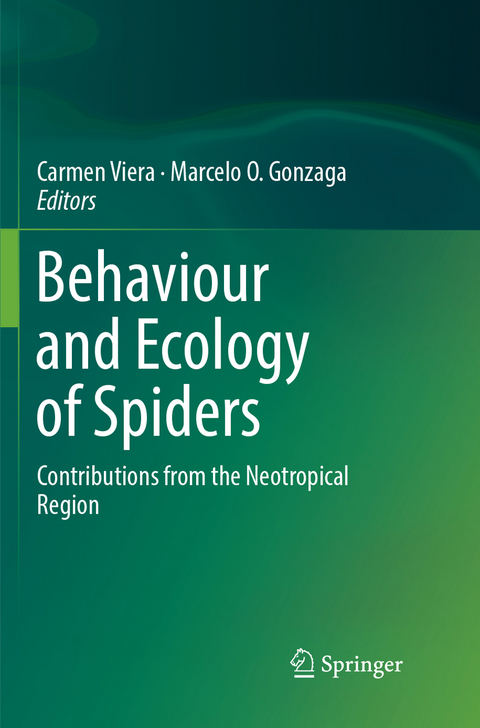
Behaviour and Ecology of Spiders
Springer International Publishing (Verlag)
978-3-319-88089-1 (ISBN)
Carmen Viera is Professor and Director of Department of Animal Biology of Facultad de Ciencias, Universidad de la Republica and Director of the Laboratory of Behavioral Ecology of Instituto de Investigaciones Biologicas Clemente Estable, Uruguay founded by her in 2008. She is researcher in the Sistema Nacional de Investigadores (SNI) Professor of Entomology of Facultad de Ciencias and Coordinator of Zoology in Post-graduation Program (PEDECIBA). She has experience in behavioral ecology and sociobiology. Marcelo O. Gonzaga is professor at Universidade Federal de Uberlandia, Minas Gerais, Brazil, since 2008. He earned his bachelor's degree at Universidade Federal de Minas Gerais (1996), and his master's and doctorate at Universidade Estadual de Campinas (1999, 2004). He had a post-doctoral fellowship in Universidade Estadual de Campinas (2006) and developed a project in the Program "Young Researches Awards" of FAPESP in Department of Ecology and Evolutionary Biology of Universidade Federal de Sao Carlos (2007-2008). He was the coordinator of the Post-graduation Program in Ecology and Conservation of Natural Resources of Universidade Federal de Uberlandia (2012-2014). He has experience in behavioral ecology, acting mainly in the following subjects: spider webs construction and variation, sociobiology, host behavioral manipulation by parasitoids, parental care in spiders.
Chapter 1. Diversity and Distribution of Araneomorph Spiders in the Neotropics.- Chapter 2. Biodiversity and Biogeography of Neotropical Mygalomorphae.- Chapter 3. Neotropical Arachnological Collections: Basic Tools for the Development in the Spiders Research.- Chapter 4. Habitat Selection and Dispersion in Neotropical Spiders.- Chapter 5. Dispersal Strategies, Genetic Diversity and Distribution: Implications on Conservation in Two South American Sand-dwelling Wolf Spiders.- Chapter 6. Webs: function, structure and variation.- Chapter 7. Interactions Among Spiders and Plants: an Ecological Approach.- Chapter 8. Spiders as Plant-Partners: Complementing Ant Services in Extrafloral Nectaried Plant Communities.- Chapter 9. Foraging strategies of cursorial and ambushing spiders.- Chapter 10. Trophic Specialization.- Chapter 11. Spiders associated to agroecosystems, roles and perspectives.- Chapter 12. Chemical Communication in Neotropical Spiders.- Chapter 13. Sexual selection and mating behaviors.- Chapter 14. Parental care and sociality.- Chapter 15. Plasticity and cognition in spiders.- Chapter 16. Host behavioural manipulation of spider hosts by parasitoid wasps.- Chapter 17. Anti-predator strategies in neotropical spiders.
| Erscheint lt. Verlag | 11.9.2018 |
|---|---|
| Zusatzinfo | XVII, 437 p. 91 illus., 54 illus. in color. |
| Verlagsort | Cham |
| Sprache | englisch |
| Maße | 155 x 235 mm |
| Gewicht | 932 g |
| Themenwelt | Medizin / Pharmazie ► Studium |
| Naturwissenschaften ► Biologie ► Humanbiologie | |
| Naturwissenschaften ► Biologie ► Zoologie | |
| Schlagworte | Behavioural plasticity • Biogeography of spiders • Entomology • Foraging strategies in spiders • Habitat selection in spiders • Neotropical spiders • Sexual selection in spiders • Sociality in spiders • Spider behaviour • Spider webs • Tri-trophic specialization • Trophic specialization |
| ISBN-10 | 3-319-88089-6 / 3319880896 |
| ISBN-13 | 978-3-319-88089-1 / 9783319880891 |
| Zustand | Neuware |
| Haben Sie eine Frage zum Produkt? |
aus dem Bereich


